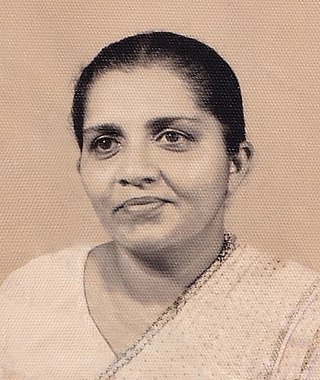Related Research Articles

The Lanka Sama Samaja Party,often abbreviated as LSSP,is a major Trotskyist political party in Sri Lanka. It was the first political party in Sri Lanka,having been founded in 1935 by Leslie Goonewardene,N.M. Perera,Colvin R. de Silva,Philip Gunawardena and Robert Gunawardena. It currently is a member of the main ruling coalition in the government of Sri Lanka and is headed by Tissa Vitharana. The party was founded with leninist ideals,and is classified as a party with socialist aims.

Violet Vivienne Goonewardene,commonly known as "Vivi",was a Sri Lankan anti-colonial activist and prominent politician,serving as one of the world's first female ministers. A key figure in both the Indian independence movement and the Sri Lankan independence movement,Goonewardene was a prominent member on the non-aligned stage,where she fought against perceived injustices and was critical of the Middle East diplomacy sponsored by the United States. Goonewardene was the first and,to date,only female National Hero of Sri Lanka. By her death,she was one of the Left's most vibrant personalities,and the foremost female figure in the Sri Lankan leftist movement.

Edmund Peter Samarakkody was a Ceylonese lawyer,trade unionist,politician and Member of Parliament.

Alexander Perera Jayasuriya was a Ceylonese politician. He was a Minister of Health,Senator and Member of Parliament. He was one of the founders of the Sri Lanka Freedom Party.

Thenahandi Wijayapala Hector Mendis was a Sri Lankan politician and a member of the Parliament of Sri Lanka.
Vaithianathan Karalasingham was a Ceylon Tamil lawyer,writer,politician and one of the leading members of the Lanka Sama Samaja Party.
Weerahennedige Theodore Wilfred Meryl Fernando was a Ceylonese teacher,trade unionist,politician and Member of Parliament.
Prins Gunasekera was a Ceylonese politician,who represented the Habaraduwa electorate in the Galle district.
Hector de Zoysa Siriwardena,CBE was a Ceylonese politician.

Somaweera Chandrasiri was a Sinhalese poet and Ceylonese politician.
Don Frank Hettiarachchi was a Ceylonese politician.
James Cornelius Thomas "Jack" Kotelawala was a lawyer and Ceylonese politician.
Kumara Vidanelage Don Sugathadasa was a Ceylonese politician.

Jayaweera Kuruppu was a Ceylonese politician.
William Neal de Alwis was a Ceylonese politician and a senior member of the Lanka Sama Samaja Party.

Mudiyanse Tennakoon was a Ceylonese politician,colloquially known as Podi Putha.
Alexander Nicholas de Abrew Abeysinge was a Ceylonese politician.
Mudiyanselage Chandrasena Ratnayake Beligammana was a Ceylonese politician
Gate Mudaliyar Alexander Edmund de Silva Wijegooneratne Samaraweera Rajapakse OBE was a Ceylonese colonial-era politician and headman.
Wijeweera Goonawardene Mahavidanege Albert Silva was a Ceylonese politician.
References
- ↑ "Hon. (Dr.) Fernando, Hector Hieronymus, M.P." Parliament of Sri Lanka . Retrieved 19 July 2018.
- ↑ Members of the Legislatures of Ceylon: 1931-1972. National Assembly Library. 1972. p. 48.
- 1 2 3 4 5 6 7 Fernando, W.T.A. Leslie (24 October 2011). "Dr. Hector Fernando worked for the marginalised". The Daily News . Retrieved 5 November 2019.
- ↑ Fernando, W.T.A. Leslie (25 October 2009). "Role of the Marxist MP Dr. Hector Fernando in Catholic Negombo". Sunday Observer . Retrieved 5 November 2019.
- ↑ Fernando, W. T. A. Leslie (29 October 2008). "Leftist Movement and the Catholic Community Setback for Leftists at Negombo Municipal Elections". The Island . Retrieved 5 November 2019.
- 1 2 3 Fernando, Warnakulasuriya Thomas Aquinas Leslie (2006). Being close to them: among some eminent personalities. Godage International Publishers. p. 110.
- ↑ "Result of Parliamentary General Election 1952" (PDF). Department of Elections, Sri Lanka.[ permanent dead link ]
- ↑ Samājaya hā Sāmayika Kēndraya (Colombo, Sri Lanka) (1992). Beyong Ethnic Conflict in Sri Lanka. Centre for Society and Religion. p. 31.
- ↑ Parliaments of Ceylon. Associated Newspapers of Ceylon. 1960. p. 40.
- ↑ "Result of Parliamentary General Election 1956" (PDF). Department of Elections, Sri Lanka.[ permanent dead link ]
- ↑ "Result of Parliamentary General Election 19 March 1960" (PDF). Department of Elections, Sri Lanka.[ permanent dead link ]
- ↑ "Result of Parliamentary General Election 20 July 1960" (PDF). Department of Elections, Sri Lanka.[ permanent dead link ]
- ↑ "Result of Parliamentary General Election 1965" (PDF). Department of Elections, Sri Lanka.[ permanent dead link ]
- ↑ Fernando, W. T. A. Leslie (3 January 2010). "Clashes between the Catholic Church and Leftists in Negombo". Sunday Observer . Retrieved 5 November 2010.